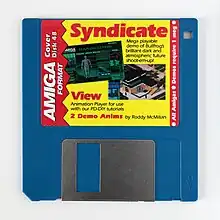.jpg.webp) The cover of the final issue of Amiga Format (May 2000) | |
| Former editors | Bob Wade Damien Noonan Marcus Dyson Steve Jarratt Nick Veitch Ben Vost |
|---|---|
| Categories | Amiga, Video games |
| Frequency | Monthly |
| Circulation | 161,256 (Jan – Jun 1992) |
| First issue | July 1989 |
| Final issue Number | May 2000 136 |
| Company | Future plc |
| Country | United Kingdom |
| Based in | Bath |
| Language | English |
| ISSN | 0957-4867 |
Amiga Format was a British computer magazine for Amiga computers, published by Future plc. The magazine lasted 136 issues from 1989 to 2000. The magazine was formed when, in the wake of selling ACE to EMAP, Future split the dual-format title ST/Amiga Format into two separate publications (the other being ST Format). In 1991, the magazine was selling 135,000 copies a month.[1]
History

Amiga Format can be thought of the "mother" or "big sister" magazine of Amiga Power, which it both predated and outlived. Whereas Amiga Power was strictly games-only, Amiga Format covered all aspects of Amiga computers, both hardware and software, both application and gaming uses. A further spin-off was Amiga Shopper, which dealt purely with the hardware and "serious" software side of the Amiga scene.
The magazine was published on a monthly basis[2] and offered various multi-issue tutorials on different application software, such as C programming or LightWave graphics rendering. The last tutorial was cut short in the middle because of the cancellation of the magazine.
Amiga Format pioneered the concept of putting complete application software on a magazine coverdisk as a response to a moratorium on complete games titles being cover-mounted.
Amiga Format was the second-to-last regularly issued print magazine about the Amiga in the United Kingdom. The last was Amiga Active, which ran for 26 issues from October 1999, although Amiga Format was the only such magazine after CU Amiga Magazine's closure in October 1998 until the launch of Amiga Active.
Regular features
Reader Games
A notable regular feature in the later stage of the magazine (introduced by then-editor Nick Veitch) was Readers' Games. Here readers of the magazine could send in games they had programmed themselves, and the magazine staff would then publish a brief review of them. In the CD-ROM edition of the magazine, all the Readers' Games were also included on the covermount CD-ROM. Most of the games were written in AMOS BASIC or Blitz BASIC.
In one issue a competition was run to find the best game developed by a reader using a previously covermounted version of Blitz BASIC. A game called Total Wormage was entered by Andy Davidson.
Although Total Wormage was disqualified as it was not submitted with working source code, Acid Software introduced Andy Davidson to Team17 who would go on to release the game commercially as Worms.
Emulators
While the continuing uncertainty about the Amiga platform's future slowed software development, there was an increase in the interest surrounding emulation software. Longtime contributor Simon Goodwin contributed one of the longest running series to the magazine, which broke down emulators by target platform and went through the mechanics of getting them working
Just the FAQs
Introduced in issue 129 and continuing until the final issue, Just the FAQs consisted of a single page each month containing an interview with a prominent figure in the Amiga community, with the exception of the January 2000 issue (published in December 1999), which instead explained the limited effects the Year 2000 problem would have on the Amiga.[3]
Interviews were conducted with Chris Wiles (managing director of Active Technologies), Neil Bothwick (founder of the Wirenet ISP), Alan Redhouse (of Eyetech), Wolf Dietrich (head of Phase 5 Digital Products), Andrew Elia (of AmigaSoc), and Ben Hermans (of Hyperion Entertainment).[4][5][6][7][8][9] In the final issue, a special interview was conducted with Eric Schwartz's cartoon character Sabrina.[10]
Backstage
Backstage was a four-page newsletter sent to subscribers with each issue. The tone of the newsletter was less formal than that of the magazine, and it would often provide behind-the-scenes information on the activities of prominent members of the Amiga Format staff. Backstage also gave details of the contents of the Subscribers' Superdisk (an extra floppy disk sent to subscribers, whose contents were also stored in a password-protected archive on the cover CD), and featured special offers for subscribers.
References
- ↑ Schofield, Jack (October 10, 1991). "Discs that make the magazines front page". The Guardian. p. 35. Retrieved August 17, 2023 – via Newspapers.com.
- ↑ "AMIGA Magazines from the UK". Amiga Magazines List. Retrieved 4 October 2015.
- ↑ Olaf Barthel, "Just the FAQs", Amiga Format, January 2000 (issue 132), 86
- ↑ Chris Wiles, "Just the FAQs", Amiga Format, November 1999 (issue 129), 92
- ↑ Neil Bothwick, "Just the FAQs", Amiga Format, December 1999 (issue 130), 92
- ↑ Alan Redhouse, "Just the FAQs", Amiga Format, Christmas 1999 (issue 131), 86
- ↑ Wolf Dietrich, "Just the FAQs", Amiga Format, February 2000 (issue 133), 86
- ↑ Andrew Elia, "Just the FAQs", Amiga Format, March 2000 (issue 134), 78
- ↑ Ben Hermans, "Just the FAQs", Amiga Format, April 2000 (issue 135), 78
- ↑ Eric Schwartz, "Just the FAQs", Amiga Format, May 2000 (issue 136), 78
External links
- Amiga History Guide: Amiga Format
- David Viner - UK Computer Magazines
- Amiga Format Magazine Issue Archive
- Archived articles originally published in Amiga Format:
- Amiga audio, networking and system stability
- A long-running series of articles about emulators (for other computers running on Amigas)